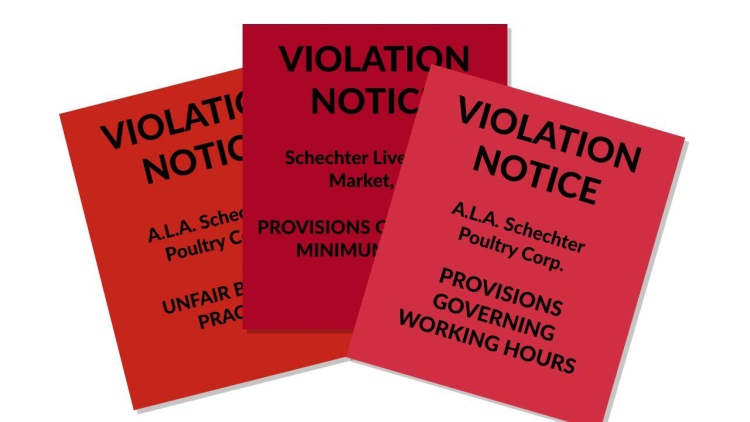A.L.A. Schechter Poultry Corp. v. United States
United States Supreme Court
295 U.S. 495 (1935)

- Written by Eric Cervone, LLM
Facts
A.L.A. Schechter Poultry Corp. (defendant) operated wholesale poultry slaughterhouse markets in Brooklyn, New York. Ordinarily, Schechter bought live poultry in New York City or occasionally in Philadelphia for slaughter and resale. When the poultry reached Schechter’s Brooklyn markets, it was slaughtered and locally sold to poultry retailers and butchers who dealt directly with consumers. Schechter did not sell poultry in interstate commerce. Schechter was convicted of 18 counts of violating the Live Poultry Code (LPC) regulations passed by Congress and with one count of conspiracy to violate the LPC. The LPC was promulgated under § 3 of the National Industrial Recovery Act, which authorized the president of the United States to approve “codes of fair competition” for a trade or industry. Schechter’s violations of the LPC included issues relating to its employees’ hours and wages and the quality of its poultry products sold to local New York retailers. Schechter appealed its convictions in the United States Court of Appeals for the Second Circuit, alleging that Congress exceeded its power to regulate interstate commerce by passing regulations over Schechter’s in-state activities. Additionally, Schechter argued that the president engaged in impermissible lawmaking by having full discretion to approve or disapprove the LPC provisions. The appellate court sustained the convictions on 16 counts but reversed the conspiracy charge and two convictions pertaining to Schechter’s improper labor standards. The circuit court ruled that the regulations were beyond Congress’s power to regulate and that the president engaged in impermissible lawmaking functions. The United States Supreme Court granted certiorari.
Rule of Law
Issue
Holding and Reasoning (Hughes, C.J.)
Concurrence (Cardozo, J.)
What to do next…
Here's why 907,000 law students have relied on our case briefs:
- Written by law professors and practitioners, not other law students. 47,100 briefs, keyed to 996 casebooks. Top-notch customer support.
- The right amount of information, includes the facts, issues, rule of law, holding and reasoning, and any concurrences and dissents.
- Access in your classes, works on your mobile and tablet. Massive library of related video lessons and high quality multiple-choice questions.
- Easy to use, uniform format for every case brief. Written in plain English, not in legalese. Our briefs summarize and simplify; they don’t just repeat the court’s language.





